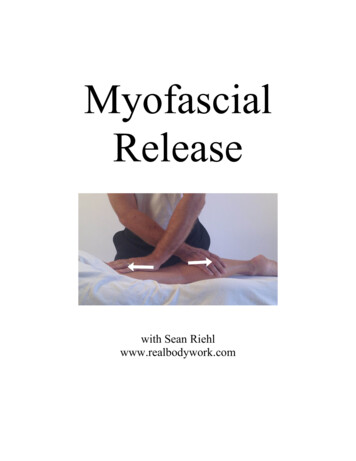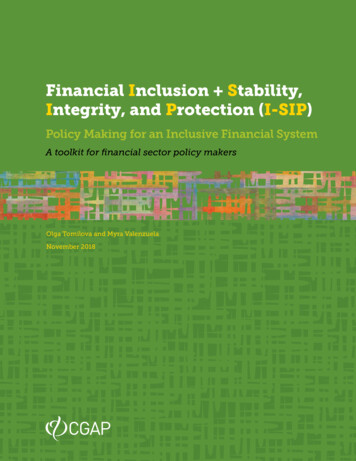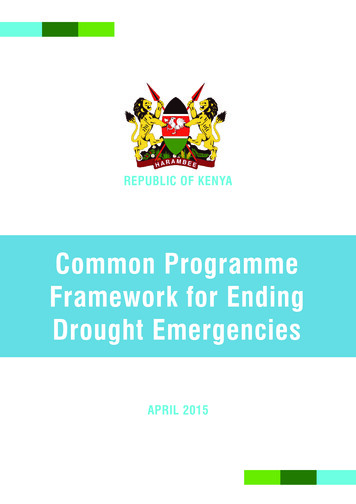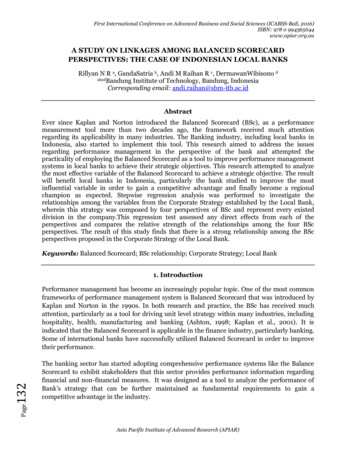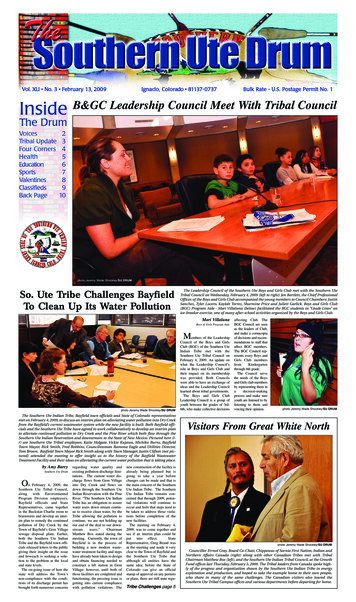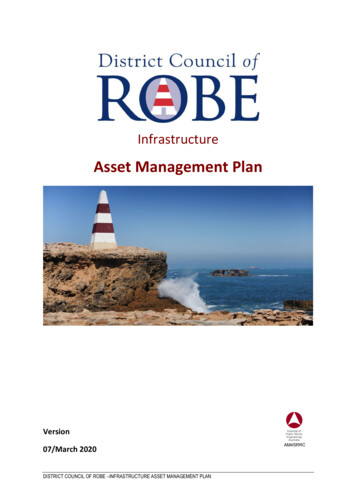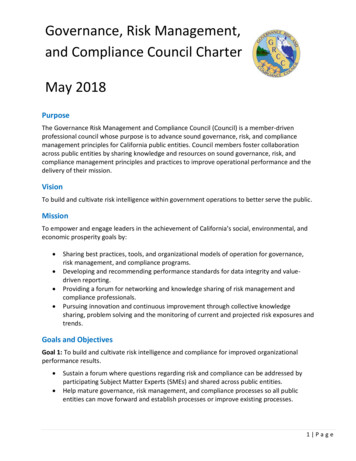
Transcription
The Council on LinkagesBetween Academia andPublic Health PracticeCouncil on Linkages Between Academiaand Public Health PracticeVirtual Meeting Monday, July 16, 201812:00-2:00 pm EDT Registration 615089063009027 Funding provided by the Centers for Disease Control and Prevention Staffed by the Public Health Foundation
Table of Contents1.2.3.4.5.6.7.Meeting AgendaCouncil Member ListDraft Meeting Minutes – December 12, 2017State of the Council: Where We’ve Been, Where We Are, Where We’reHeadedCore Competencies for Public Health Professionals: Core Competencies for Public Health Professionals Report Competencies for Performance Improvement Professionals inPublic Health Quad Council Coalition’s 2018 Community/Public Health NursingCompetenciesAcademic Health Department Learning Community: Academic Health Department Learning Community Report Staged Model of AHD Development (Draft)Supplemental Materials: Council Constitution and Bylaws Council Participation Agreement Council Strategic Directions, 2016-2020Activities of the Council on Linkages Between Academia and Public Health Practice (Council on Linkages) are made possible through funding from theCenters for Disease Control and Prevention under Cooperative Agreement Number U38OT000211. The content of Council on Linkages activities aresolely the responsibility of the Council on Linkages and do not necessarily represent the official views of the sponsor.
1. Meeting Agenda
The Council on LinkagesBetween Academia andPublic Health PracticeCouncil on Linkages Between Academia and Public Health PracticeVirtual MeetingDate: Monday, July 16, 2018Time: 12:00-2:00pm EDTRegister for Web Access: 89063009027AGENDA12:00-12:05Welcome and Overview of AgendaBill Keck12:05-12:10Approval of Minutes from December 12, 2017 Meeting Action Item: Vote on Approval of MinutesBill Keck12:10-1:00State of the Council: Where We’ve Been, Where We Are, WhereWe’re Headed (Council Strategic Directions – A.1.b., A.1.c., C.1.e.)Bill Keck, Ron Bialek1:00-1:30Core Competencies for Public Health Professionals (CouncilStrategic Directions – B.1.b., B.1.e., C.3.a., C.3.b., C.3.c., C.3.d.) Core Competencies Use Healthy People 2030 New Competencies Released:o Competencies for Performance ImprovementProfessionals in Public Healtho Quad Council Coalition’s 2018 Community/Public HealthNursing CompetenciesAmy Lee, Janet Place1:30-1:50Academic Health Department Learning Community (CouncilStrategic Directions – A.1.a., A.1.b., A.1.d, A.2.b.) AHD Webinar Series and Ask the AHD Expert Column Staged Model of AHD Development AHD Mentorship ProgramBill Keck1:50-2:00Other Business and Next StepsBill Keck2:00AdjournKathleen AmosSusan Little
2. Council Member List
The Council on LinkagesBetween Academia andPublic Health PracticeCouncil on Linkages MembersCouncil Chair:C. William Keck, MD, MPHAmerican Public Health AssociationCouncil Members:Susan Swider, PhD, APHN-BCAmerican Association of Colleges of NursingLaura Rasar King, MPH, MCHESCouncil on Education for Public HealthBeverly Taylor, MDAmerican College of Preventive MedicineHealth Resources and Services AdministrationAssociation for Community Health ImprovementBeth Ransopher, RS, MEPNational Association of County and City HealthOfficialsAmy Lee, MD, MPH, MBAAssociation for Prevention Teaching andResearchChristina Dokter, MA, PhDNational Association of Local Boards of HealthGary Gilmore, MPH, PhD, MCHESAssociation of Accredited Public HealthProgramsCarolyn Harvey, PhDNational Environmental Health AssociationPhilip Amuso, PhDAssociation of Public Health LaboratoriesLisa Lang, MPPNational Library of MedicineLynn Goldman, MD, MS, MPHAssociation of Schools and Programs of PublicHealthPatrick Lenihan, PhDNational Network of Public Health InstitutesWendy Braund, MD, MPH, MSEd, FACPMAssociation of State and Territorial HealthOfficialsLouis Rowitz, PhDNational Public Health Leadership DevelopmentNetworkAssociation of University Programs in HealthAdministrationSusan Little, DNP, RN, PHNA-BC, CPHQQuad Council Coalition of Public Health NursingOrganizationsRebecca Gold, JDCenters for Disease Control and PreventionMichael Fagen, PhD, MPHSociety for Public Health EducationBarbara Gottlieb, MDCommunity-Campus Partnerships for HealthMatthew ClarkVeterans Health Administration
3. Draft Meeting Minutes – December 12, 2017
Council on Linkages Between Academia and Public Health Practice Virtual MeetingDate: December 12, 2017Meeting Minutes – DraftMembers and Designees Present: Wendy Braund, Christina Dokter, Michael Fagen, Gary Gilmore, JerryGlandon, Rita Kelliher, Laura Rasar King, Lisa Lang, Patrick Lenihan, Susan Little, Beth Ransopher, AlRichmondOther Participants Present: Angela Aidala, Janet Aikins, Magali Angeloni, Sophia Anyatonwu, CarolineBartha, Debra Bragdon, Vera Cardinale, LeAnna Cates, John Contreras, Yvette Daniels, Teresa Daub,Ashley Edmiston, Kaitlin Emrich, Steven Godin, Nadim Haddad, Heather-Lyn Haley, Terry Helinski, TanyaHonderick, Barbara Ann Hughes, Jonathan James, Karyn Johnstone, Lolita Kirk, Vanessa Lamers, JoanLane, Laura Magana, Bryn Manzella, Viviana Martinez-Banchi, Phyllis Meadows, Meagan Mikkelsen,Candace Nelson, Janet Place, Hope Rollins, Russ Rubin, Lisa Sedlar, Samantha Shaver, Lenee Simon,Cyndi Stern, Bobbi Sykes, Shari Tedford, J.T. Theofilos, Hugh Tilson, Laura Valentino, Jack Wong, LauraZeigenStaff Present: Ron Bialek, Kathleen Amos, Janelle Nichols, Keiona JonesAgenda ItemDiscussionWelcome and Overviewof AgendaThe meeting began with a welcome by CouncilDirector Ron Bialek, MPP. Mr. Bialek sharedregrets from Council Chair C. William Keck,MD, MPH, who was unable to attend.ActionMr. Bialek reminded participants of theCouncil’s mission and reviewed the agenda forthe meeting.Mr. Bialek introduced a new Council staffmember: Keiona Jones, Project Assistant,Public Health Foundation (PHF).Approval of Minutes fromOctober 2, 2017 Meeting Action Item: Vote onApproval of MinutesRequest for CouncilMembership Vote –Veterans HealthAdministration Action Item: Vote onMembership RequestMr. Bialek asked for any changes to theminutes from the October 2, 2017 Councilmeeting. Gary Gilmore, MPH, PhD, MCHES,moved to approve the minutes as written. LisaLang, MPP, seconded the motion. No additionsor corrections.Minutes of the October 2,2017 Council meetingwere approved as written.Mr. Bialek informed the Council that theVeterans Health Administration (VHA) hasrequested to join the Council. Mr. Bialekwelcomed Karyn Johnstone, MPH, NationalCoordinator of Interagency Shared Training,VHA Employee Education System, to speak onbehalf of VHA.VHA was grantedpreliminary Councilmembership.Mr. Bialek asked for discussion on grantingpreliminary membership to VHA. Dr. Gilmoremoved to grant preliminary membership. SusanLittle, DNP, RN, PHNA-BC, CPHQ, secondedthe motion.
December 12, 2017 Meeting Minutes – DraftCDC: Public HealthAssociate ProgramJ.T. Theofilos, MBA, Team Lead, Partnershipsand Stakeholder Engagement, Public HealthAssociate Program (PHAP), Centers forDisease Control and Prevention (CDC), sharedinformation about CDC’s PHAP program andopportunities to participate in the program as ahost site or associate. PHAP is a two-yeartraining program with the CDC that placesassociates in public health agencies andnongovernmental organizations across the US.For the next PHAP class, which starts inOctober 2018, the application period forassociates will be open from January 2-8,2018, and for prospective host sites fromJanuary 2-18, 2018.The Kresge Foundation:Emerging Leaders inPublic Health InitiativeGuest speaker Phyllis Meadows, PhD, SeniorFellow – Health, The Kresge Foundation,discussed Kresge’s Emerging Leaders inPublic Health (ELPH) Initiative. ELPH is aprogram to develop public health leaders inwhich a public health officer and emergingleader work together as a team. Theapplication period for the third ELPH cohort isexpected to open in mid-2018Council staff will shareinformation about theELPH application periodwith the Council when it isavailable.Questions about Kresge’sELPH Initiative can besent to Kathleen Amos atkamos@phf.org.Mr. Bialek invited questions for Dr. Meadows.Advocating for the PublicHealth Workforce: TheRole of the CouncilGuest speaker and former Council member,Hugh Tilson, MD, DrPH, MPH, spoke to theCouncil about the role of the Council inadvocating for the public health workforce, theCouncil’s long history of doing so, andopportunities for the Council moving forward.Council staff will invite Dr.Tilson to continue thisdiscussion at a futureCouncil meeting.Demonstrating CouncilImpactMr. Bialek asked Council members to shareexamples of ways the Council’s work hasimpacted Council member organizations’members and constituents. This will assist indocumenting the collective impact of theCouncil.Examples of ways theCouncil’s work hasimpacted Council memberorganizations’ membersand constituents can beshared with KathleenAmos at kamos@phf.org.Council MemberRequest: NewApproaches to Practicebased ResearchThe Council offers a venue for individualmember organizations to raise topics fordiscussion that could benefit from input of otherCouncil member organizations. Councilmember organizations are welcome to takeadvantage of this as needs and opportunitiesarise.Topics Council memberorganization would like topropose for discussion atCouncil meetings can beshared with KathleenAmos at kamos@phf.org.The National Network of Public HealthInstitutes’ Council representative, PatrickLenihan, PhD, led a discussion on the need fornew approaches to practice-based researchand for leadership and advocacy to promotethis.Council staff will discusswith the Council Chairbringing this topic to theAcademic HealthDepartment (AHD)Learning Community for2
December 12, 2017 Meeting Minutes – DraftMr. Bialek invited discussion or questions forDr. Lenihan.PerformanceImprovement andPopulation HealthCompetenciesfurther discussion.Council Assistant Director Kathleen Amos,MLIS, provided an update on the efforts todevelop performance improvement (PI) andpopulation health competencies.Two draft sets of discipline-specificcompetencies based on the CoreCompetencies for Public Health Professionals(Core Competencies) will soon be open forfeedback to help with refining and finalizingeach set.The draft PI Competencies define and describeskills and competencies desirable for PIprofessionals working in public health, andexpand upon PI concepts present in the CoreCompetencies. These draft competencies havebeen refined based on feedback from thepublic health community and an environmentalscan, and the current draft contains 19competencies. A PI Competencies Subgroupwas created under the Core CompetenciesWorkgroup and provides guidance for thiseffort.The draft Priority Competencies for PopulationHealth Professionals began as a collaborationbetween PHF and the Association forCommunity Health Improvement to describedesired skills for population healthprofessionals and are primarily designed fornon-clinical hospital, health system, publichealth, and healthcare professionals engagedin assessment of population health needs anddevelopment, delivery, and improvement ofpopulation health programs, services, andpractices. Feedback has been collected andused to refine these competencies over thepast year. The current draft of thesecompetencies contains 31 competenciesorganized into 5 categories.As the feedback process begins for both ofthese draft competency sets, additionalinformation will be shared in a variety of ways,including through the Council on LinkagesUpdate, PHF E-News, Core CompetenciesWorkgroup, and PI Competencies Subgroup.Feedback on these draft competency sets iswelcome and encouraged. Help in sharing thefeedback opportunity will also be appreciated.Feedback is expected to be accepted throughFebruary or March 2018 and will be used torefine the competency sets, with the goal ofreleasing both sets by mid-2018.3Feedback on the draft PICompetencies or PriorityCompetencies forPopulation HealthProfessionals may beshared with KathleenAmos at kamos@phf.org.Council staff will contactCouncil memberorganizations, asappropriate, forassistance indisseminating requestsfor feedback on these
December 12, 2017 Meeting Minutes – DraftMr. Bialek invited questions for Ms. Amos.Core Competencies forPublic HealthProfessionalsdraft competency sets.Core Competencies Workgroup Co-Chair JanetPlace, MPH, provided an update on workrelated to the Core Competencies and progressmade during 2017.To date in 2017, the Core Competencies havebeen accessed nearly 37,000 times, andresources and tools that support use of theCore Competencies have been accessed closeto 70,000 times. The most popular resourcesand tools include competency assessmentsand collections of job descriptions, examples ofhow organizations use the Core Competencies,and workforce development plans. Both theAssociation of State and Territorial HealthOfficials (ASTHO) and National Association ofCounty and City Health Officials (NACCHO)released updated data about use of the CoreCompetencies by health departments throughtheir Profile studies this year. The ASTHOProfile study, based on research conducted in2016, indicates that approximately 80% of statehealth departments use the CoreCompetencies. The 2016 National Profile ofLocal Health Departments study conducted byNACCHO shows a 73% increase in use of theCore Competencies among local healthdepartments since the study was lastcompleted in 2013 – with usage growing from26% to 45%.To support organizations in using the CoreCompetencies, a modified version of the CoreCompetencies was developed and is availablethrough the Council website. This version isbased on Tier 2 of the Core Competencies andgroups competencies that share a commontheme together to reduce the number ofindividual items to focus on in workforcedevelopment efforts. A new CoreCompetencies tool, Determining Essential CoreCompetencies for Public Health Jobs: APrioritization Process, was released in June2017 and featured in a webinar and sessions atthe 2017 Public Health Improvement Trainingand American Public Health AssociationAnnual Meeting. Twelve new job descriptionsand a new workforce development plan thatincorporate the Core Competencies wereadded to the existing online collections of theseresources, and additional examples for thesecollections are welcome. Competency sets thatdraw on the Core Competencies also continuedto be developed, including the PopulationHealth Competencies and PI Competencies.Earlier in 2017, after considering requests from4Additional examples thatcan be included in thecollections of jobdescriptions andworkforce developmentplans that incorporate theCore Competencies, aswell as other examples ofhow the CoreCompetencies are being
December 12, 2017 Meeting Minutes – Draftthe public health community and usage of theCore Competencies, the Council determinedthat the Core Competencies would not beopened for review this year, allowing work to bedone to develop these tools and resources tocontinue to support use of the CoreCompetencies.Additionally in 2017, Council staff participatedin a Public Health Workforce Interest andNeeds Survey (PH WINS) workgroup tosupport the incorporation of concepts from theCore Competencies into their assessment tool;the Core Competencies Workgroup grew tonearly 100 members and began a discussion ofCouncil involvement in recognition of disciplinespecific competency sets based on the CoreCompetencies; and the PI CompetenciesSubgroup was formed with nearly 90 membersto support refinement of the PI Competencies.Three blog posts and one news articlehighlighting work related to the CoreCompetencies were published on the PHFwebsite and viewed more than 500 times, andCouncil staff responded to more than 40distance technical assistance (TA) requests,serving nearly 40 organizations in 19 states,Guam, and Uganda.Mr. Bialek invited questions about activitiesrelated to the Core Competencies.Academic HealthDepartment LearningCommunityMs. Amos provided an update on activities ofthe AHD Learning Community in 2017.The AHD Learning Community was involved ina variety of activities in 2017, includingdevelopment and enhancement of tools andresources, hosting of virtual meetings, anddevelopment and dissemination of relatedcommunications. The Learning Communitygrew to approximately 750 members,representing organizations in all 50 states, DC,and four US territories. To date in 2017, theLearning Community and its resources andtools have been accessed more than 6,000times, and Council staff responded to morethan 25 requests for distance TA, serving morethan 20 organizations in 13 states.Four AHD Learning Community meetings wereheld in March, May, July, and September tohighlight progress being made on AHDpartnerships. All of these meetings wererecorded and are available through the Councilwebsite, TRAIN Learning Network, andYouTube. A new quarterly Ask the AHD Expertseries was launched on the PHF Pulse blog,with columns published in March, June, and5used, are welcome byemail to Janelle Nichols atjnichols@phf.org.
December 12, 2017 Meeting Minutes – DraftSeptember, and a fourth planned forDecember. A staged model of AHDdevelopment was drafted, with the aim of betterarticulating how AHD partnerships mightdevelop. This model illustrates the potentialdevelopment of such partnerships on acontinuum and is currently open for feedback.An article describing the development of theAHD Research Agenda was published in theSeptember 2017 issue of the American Journalof Public Health. Seven AHD partnerships wereadded to the list of AHD partnerships on theCouncil website, and three partnershipagreements were added to the collection ofAHD partnership agreements. The AHDMentorship Program created seven additionalmentor-mentee matches, bringing the currenttotal to 15 pairs working together to move AHDefforts forward.Mr. Bialek invited questions about the AHDLearning Community.Other Business and NextStepsMr. Bialek reiterated the request for input fromCouncil members about the impact of theCouncil and its resources and tools.Mr. Bialek asked if there was any otherbusiness to address.Future Council meetings have not beenscheduled, but will likely be held virtually.Council staff will be in contact with Councilmembers to schedule meetings for 2018.6Feedback related to thedraft staged model ofAHD development maybe shared with KathleenAmos at kamos@phf.org.Additional AHDpartnerships or AHDpartnership agreementsthat can be added to theCouncil website can besent to Janelle Nichols atjnichols@phf.org.Expressions of interest inparticipating in the AHDMentorship Program as amentor or mentee can besent to Janelle Nichols atjnichols@phf.org.Input on the impact of theCouncil and its resourcesand tools may be sharedwith Kathleen Amos atkamos@phf.org.Council staff will schedulemeetings for 2018.
4. State of the Council: Where We’ve Been,Where We Are, Where We’re Headed
The Council on LinkagesBetween Academia andPublic Health PracticeState of the Council ReportJuly 16, 2018OverviewFor more than 25 years, the Council on Linkages Between Academia and Public Health Practice(Council) has been providing support for the US public health workforce and advancingworkforce development efforts nationwide. This has included early work to lay the groundworkfor The Community Guide (The Guide to Community Preventive Services) and the field of publichealth services and systems research (PHSSR), contributions to Council on Education forPublic Health accreditation for schools and programs of public health and Public HealthAccreditation Board accreditation for health departments, development of foundationalcompetencies for the practice and teaching of public health, and strengthening partnerships andcollaboration between public health practice and academia. Over this history, the Council hasgrown from nine member organizations to 23, expanding its breadth and bringing in a range ofstakeholders whose efforts align in the goal of improving the public’s health.Discussion during this Council meeting will focus on: 1) the impact of the Council; 2) currentCouncil initiatives; and 3) future opportunities for the Council. Council members will have anopportunity to share ways the Council’s work has impacted their organizations and constituentsas part of this discussion.
5. Core Competencies for Public HealthProfessionals: Core Competencies for Public HealthProfessionals Report Competencies for PerformanceImprovement Professionals in PublicHealth Quad Council Coalition’s 2018Community/Public Health NursingCompetencies
The Council on LinkagesBetween Academia andPublic Health PracticeCore Competencies for Public Health Professionals ReportJuly 16, 2018OverviewThe Core Competencies for Public Health Professionals (Core Competencies) reflectfoundational skills desirable for professionals engaged in the practice, education, and researchof public health and are used in education, training, and other workforce development activitiesacross the country. The current version of the Core Competencies was released by the Councilon Linkages Between Academia and Public Health Practice (Council) in June 2014. Councilefforts related to the Core Competencies are guided by the Core Competencies Workgroup,which has more than 90 members representing a variety of practice and academicorganizations and interests within the public health field.Core Competencies UseThe Core Competencies continue to be widely used within public health workforce development.Since release of the current version of the Core Competencies in 2014, the Core Competencieshave been accessed online more than 180,000 times, and resources and tools designed tosupport implementation of the Core Competencies have been accessed online more than510,000 times. Recent data from the Association of State and Territorial Health Officials andNational Association of County and City Health Officials show that approximately 80% of statehealth departments and 45% of local health departments are using the Core Competencies.Tools to support this use continue to be a focus, with a competency assessment based on themodified version of the Core Competencies released last year currently under development.Work also continues to better highlight how organizations are using the Core Competencies. Aredesign of a section of the Council website to highlight these stories and examples isunderway, and additional stories and examples to feature on the Council website are welcomeand may be sent to Kathleen Amos at kamos@phf.org.Healthy People 2030The Core Competencies are integrated into three objectives within the Public HealthInfrastructure (PHI) topic area of Healthy People 2020. These objectives focus on the use of theCore Competencies in public health agency job descriptions and performance evaluations,continuing education, and academic curricula. Planning is currently underway for HealthyPeople 2030, and earlier this year, Council staff met with the team working on the PHI topicarea to offer input into PHI objectives. Work toward determining objectives is still in process, butit is anticipated that Healthy People 2030 will include many fewer objectives than HealthyPeople 2020. As work to develop Healthy People 2030 continues, a public comment period willoffer an opportunity to provide addition input into the objectives. The Council will be informedwhen that public comment period opens, which is likely to be toward the end of this year.New Competencies ReleasedIn addition to supporting development of foundational, or cross-cutting, skills for professionalsworking in public health, the Core Competencies support the development of discipline-specificcompetency sets. A variety of competency sets have drawn on the Core Competencies and theexpertise of Council staff and Core Competencies Workgroup members in their developmentand implementation. For example, within the past two years, Council staff and CoreCompetencies Workgroup members have engaged in efforts related to the Competencies forPerformance Improvement Professionals in Public Health, Competencies for Population HealthProfessionals, Competencies Guidelines for Public Health Laboratory Professionals, Including1
People with Disabilities: Public Health Workforce Competencies, and Legal EpidemiologyCompetency Model. Additional competency sets that draw on the Core Competencies includethe Community/Public Health Nursing Competencies, Competencies for AppliedEpidemiologists in Governmental Public Health Agencies, Competencies for Health EducationSpecialists, and Competencies for Public Health Informaticians.Competencies for Performance Improvement Professionals in Public HealthThe Competencies for Performance Improvement Professionals in Public Health (PICompetencies), a set of skills desirable for performance improvement (PI) professionals workingin public health, were developed to offer additional guidance in PI for public health professionalswith responsibilities related to developing or implementing plans and activities in the areas ofquality improvement, performance management, workforce development, accreditationreadiness, or community health assessment and improvement planning. Released in June 2018by the Public Health Foundation, these competencies are based on and align with the CoreCompetencies, and can be used along with the Core Competencies to help guide workforcedevelopment for PI professionals. To support public health professionals and organizations inusing the PI Competencies, a supplemental resource that presents the PI Competencies alongwith a list of competencies from the Core Competencies that may be especially relevant for PIprofessionals was also developed. Work on this competency set and related resource wasguided by the Performance Improvement Competencies Subgroup of the Core CompetenciesWorkgroup, which includes more than 80 members.Community/Public Health Nursing CompetenciesThe Quad Council Coalition of Public Health Nursing Organizations recently released the 2018Community/Public Health Nursing (C/PHN) Competencies, which were updated to align with thecurrent version of the Core Competencies, as well as a variety of other related nursingcompetencies. The C/PHN Competencies use the same eight domains and three-tier structureas the Core Competencies. The C/PHN Competencies reflect the unique competencies requiredfor the practice of public health nursing and can be used by public health nurses from entrylevel to senior management/leadership in a variety of practice settings.More information about the Core Competencies and Core Competencies activities is availablethrough the Core Competencies section of the Council website or by contacting Kathleen Amosat kamos@phf.org.2
Core Competencies Workgroup MembersCo-Chairs: Amy Lee, Northeast Ohio Medical University Janet Place, Arnold School of Public Health, University of South CarolinaMembers: Nor Hashidah Abd Hamid Angela Aidala, Region 2 Public Health Training Center, Columbia University Liz Amos, National Library of Medicine Sandra Anyanwu-nzeribe Sophia Anyatonwu, Texas Department of State Health Services, Region 7 Sonja Armbruster, College of Health Professions, Wichita State University Bobbie Bagley, Nashua Division of Public Health & Community Services (NH) Cynthia Baker, Prince George's County Health Department (MD) Noel Bazini-Barakat, Los Angeles County Department of Public Health (CA) Dawn Beck, Olmsted County Public Health Services (MN) Roxanne Beharie, Ashford University Alan Bergen, Pima County Health Department (AZ) Linda Beuter, Livingston County Department of Health (NY) Michael S. Bisesi, College of Public Health, The Ohio State University Jeanne Bowman, Champaign Health District (OH) Keree Brannen, Austin Public Health (TX) Tom Burke, Bloomberg School of Public Health, Johns Hopkins University Belinda Caballero, David Jurkovich MD PLLC; BC Billing LLC (FL) Candy Cates, Oregon Health Authority Marita Chilton, Public Health Accreditation Board Michelle Chino, School of Community Health Sciences, University of Nevada, Las Vegas Samantha Cinnick, Region 2 Public Health Training Center, Columbia University Michelle Cravetz, School of Public Health, University at Albany Oriyomi Dawodu, School of Medicine, University of Maryland Marilyn Deling, Olmsted County Public Health Services (MN) Anjali Deshpande, College of Public Health, University of Iowa Diane Downing Mark Edgar, School of Medicine and Public Health, University of Wisconsin Dena Fife Colleen Fitzgibbons, The Ohio State University Linda Rose Frank, Graduate School of Public Health, University of Pittsburgh Jen Freiheit, Bay View Advanced Management, LLC Kristine Gebbie Brandon Grimm, College of Public Health, University of Nebraska Medical Center John Gwinn, University of Akron Viviana Horigian, University of Miami Emmanuel Jadhav, Ferris State University Larry Jones Vinitsa Karatsu, County of Los Angeles Department of Public Health (CA) Bryant T. Karras, Washington State Department of Health Laura Rasar King, Council on Education for Public Health David Knapp, Kentucky Department for Public Health Kathy Koblick, Marin County Department of Health and Human Services (CA) Kirk Koyama, Health Resources and Services Administration Rajesh Krishnan, The Preventiv3
Cynthia LamberthAngela Landeen, University of South DakotaLisa Lang, National Library of MedicineCaitlin Langhorne, Association of State and Territorial Health OfficialsJessie Legros, Centers for Disease Control and PreventionJami Lewis, Clay County Public Health Center (MO)Jen Lewis, Sonoma County Department of Health Services (CA)Linda Lewis, Butte County Publi
Public Health (ELPH) Initiative. ELPH is a program to develop public health leaders in which a public health officer and emerging leader work together as a team. The application period for the third ELPH cohort is expected to open in mid-2018 Mr. Bialek invited questions for Dr. Meadows. Council staff will share information about the


